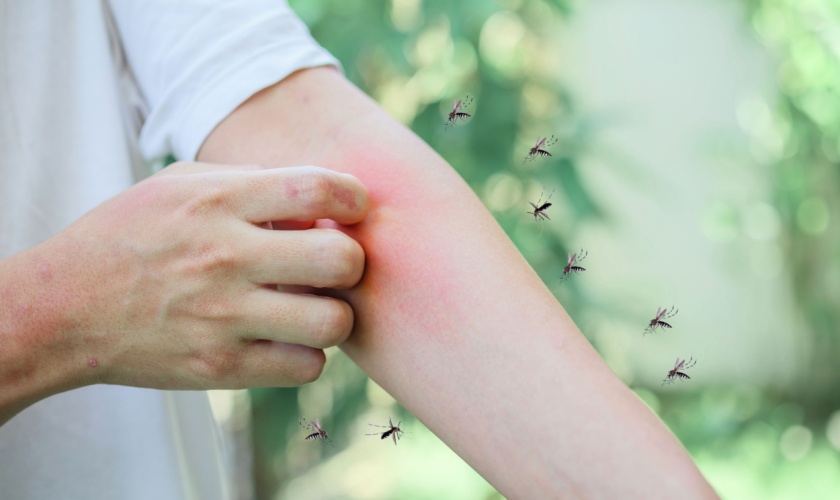If you find yourself swatting away mosquitoes every time you step outside, it’s time to take action. These pests aren’t just annoying; they can also carry diseases that put your family’s health at risk. By identifying the source of your mosquito problem and implementing targeted solutions, you can reclaim your yard and enjoy it in comfort.
Identify Mosquito Breeding Grounds
Mosquitoes need standing water to breed, and even small amounts can be enough to support a thriving population. Common breeding sites include:
- Clogged Gutters: Leaves and debris can hold water, creating a perfect nursery for mosquito larvae.
- Plant Saucers and Flowerpots: Water that collects in plant trays or pots can provide a breeding ground.
- Uncovered Trash Cans or Buckets: Open containers that catch rainwater are often overlooked sources.
- Children’s Toys and Outdoor Equipment: Toys, tire swings, and other items left outside can trap water.
Check your yard regularly for any standing water and empty it out promptly. Without water, mosquitoes can’t reproduce, so eliminating these breeding sites is one of the most effective steps you can take.
Improve Yard Maintenance
Overgrown grass, bushes, and shrubs offer cool, shaded areas where adult mosquitoes rest during the day. Keep your yard well-trimmed and tidy:
- Mow the Lawn: Shorter grass dries more quickly after rain, making it less attractive to mosquitoes.
- Prune Shrubs and Trees: Reducing dense foliage helps eliminate hiding spots.
- Clear Debris: Remove leaf piles, brush, and other clutter where mosquitoes might take shelter.
By maintaining your yard, you make it less hospitable for mosquitoes, reducing the number that hang around.
Use Mosquito Deterrents
There are several products and methods that can help keep mosquitoes at bay.
- Citronella Candles and Torches: These provide some relief in smaller outdoor spaces by masking human scents that attract mosquitoes.
- Fans: Mosquitoes are weak fliers, so a strong fan on a porch or patio can help keep them away.
- Mosquito Traps and Zappers: These devices attract mosquitoes and then kill them, reducing the population over time.
- Insect-Repellent Plants: Some plants, such as lavender, marigolds, and lemongrass, are known to repel mosquitoes naturally. Planting them near seating areas can help reduce mosquito activity.
Apply Yard Treatments
If your mosquito problem is more severe, consider applying treatments specifically designed for outdoor areas:
- Lawn Insecticides: Products designed to kill mosquito larvae and adult mosquitoes can be applied to grass, shrubs, and other vegetation.
- Mosquito Dunks: These larvicide products can be placed in birdbaths, ponds, or other water features to prevent mosquito larvae from maturing.
- Professional Yard Treatments: Pest control companies offer barrier treatments and other professional-grade solutions to significantly reduce mosquito populations.
Protect Yourself and Your Family
Even as you work to reduce mosquitoes in your yard, personal protection is important:
- Wear Insect Repellent: Use a repellent containing DEET, picaridin, or oil of lemon eucalyptus.
- Cover Up: Long-sleeved shirts, long pants, and socks help protect against bites.
- Avoid Peak Mosquito Hours: Mosquitoes are most active at dawn and dusk. Stay indoors during these times if possible.
When to Call a Professional
If mosquitoes continue to be a problem despite your efforts, it may be time to call in a pest control expert. Professionals can:
- Conduct a Thorough Inspection: They’ll identify hidden breeding grounds and resting areas you may have missed.
- Apply Specialized Treatments: Professional-grade sprays, larvicides, and other products can provide longer-lasting results.
- Offer Ongoing Prevention Plans: Regular treatments can keep mosquito populations down throughout the season.
Getting rid of mosquitoes in your yard takes a combination of preventative measures, regular maintenance, and the right products. By addressing breeding sites, keeping your yard well-maintained, and using effective repellents and treatments, you can enjoy a more comfortable outdoor space. If the problem persists, don’t hesitate to reach out to a professional pest control company for expert help.

